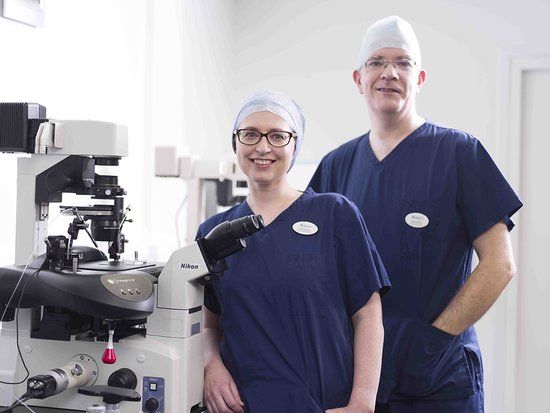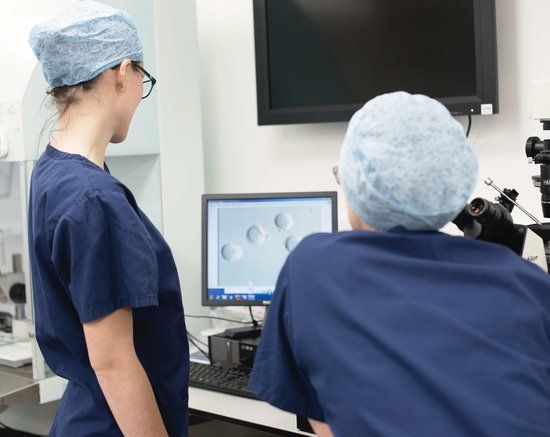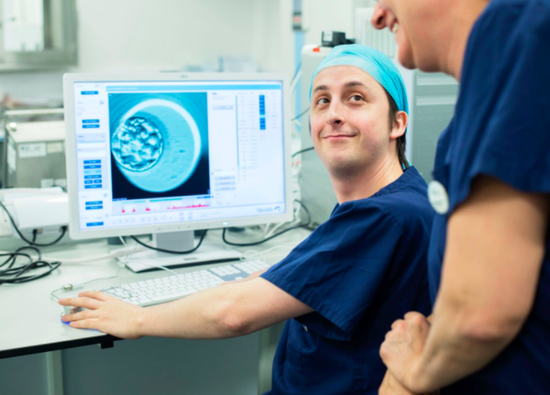At Manchester Fertility we offer patients the option of extended culture and blastocyst transfer. So what does this involve and how does it help your chances of successful treatment?
Extended culture and blastocyst transfer is a technique used after your eggs have been fertilised, which helps us to identify which of your embryos are most suitable for transfer. In some cases, it can help improve your chances of successful pregnancy. It is a useful technique if you’ve produced good quality embryos in a previous treatment cycle, but not achieved a pregnancy.
How does it work?
Instead of transferring your embryos around two to three days after fertilisation, when they reach the ‘four to eight-cell’ stage, we allow the embryos to develop for longer in our laboratory. This is extended culture, as the embryos develop for five to six days after fertilisation before they are transferred.
Embryos which develop for this longer period are known as blastocysts. In a natural cycle, an embryo develops into the blastocyst stage as it is leaving the fallopian tubes and entering the uterus. An embryo needs to have reached blastocyst stage once it arrives in the uterus, to ensure proper implantation.
And so these crucial extra days of extended culture and monitoring allow us to select only those embryos which have developed into blastocysts and have a good chance of implanting, therefore giving you a better chance of successful pregnancy.
What are the advantages and disadvantages?
The advantages of extended culture and blastocyst transfer is that it allows us to select the embryo for transfer which has the greatest potential to implant. Not only can this help increase pregnancy rates, it also reduces the need to transfer more than one embryo, and so reducing your risk of multiple pregnancy.
But it’s important to bear in mind that not all embryos will continue to develop into a blastocyst by undergoing extended culture. This can mean you have fewer suitable for transfer, or freezing for future use.
Will I automatically be offered extended culture and blastocyst transfer as part of my treatment?
No, not everyone will be suitable to have extended culture and blastocyst transfer. Our expert embryology team will decide if it is suitable for you as it depends on the number and quality of embryos available. It may be better for you to have your embryos transferred earlier.
To be suitable for extended culture and blastocyst transfer, you will need to have at least four good quality embryos (eight cells or more) on day three after fertilisation, in order for your embryos to undergo extended culture. You will be kept fully informed of the progress of your embryo development by our team.
What happens if I don’t have embryos suitable for this? Can I still use them for pregnancy?
Yes. If you don’t have four eight-cell embryos on day three after fertlisation, although we wouldn’t suggest extended culture, the chance of pregnancy is still good using your embryos.
It’s important to remember that transferring an embryo two to three days after fertilisation is still the standard, routine option for many IVF patients. And here at Manchester Fertility, all embryos are developed in a new culture medium called EmbryoGlue, which helps embryos adhere to the uterus.
What if I have more than one blastocyst available for transfer? What are my options?
If you have more than one good quality blastocyst, we advise on the option of single blastocyst transfer, which helps to reduce the risk of multiple birth. As with normal embryo transfer, any remaining blastocysts you have can be frozen and stored for future use.
Do I have to pay extra to have extended culture and blastocyst transfer?
No, at Manchester Fertility we don’t charge you for extended culture and blastocyst transfer. If it is a viable option for you, then it will be carried out at no extra cost.
For more information about blastocyst transfer and extended culture, please contact us on 0161 300 2737 or you can emaiil our team at [email protected]
Last updated: 14th March 2013






